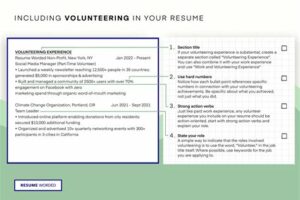Table of Contents
Looking to get involved in volunteer work? Discover the step-by-step process on how to get started in making a difference. Learn how to find volunteer opportunities, choose the right cause, and make a positive impact in your community. Find fulfilling volunteer work that aligns with your interests and values.
Volunteering is not only a selfless act, but it also provides individuals with the opportunity to grow personally and professionally. Whether you are a recent graduate looking to gain practical experience, or simply someone wanting to give back to the community, getting involved in volunteer work can be a fulfilling and rewarding endeavor. However, knowing where to start can be overwhelming. Fear not! In this guide, we will discuss the steps you can take to get into volunteer work, equipping you with the knowledge and tools necessary to make a positive impact in the lives of others.
Introduction
Volunteering is a noble endeavor that allows individuals to make a positive impact on their communities and the world at large. Whether you are looking to give back, gain new skills, or explore potential career paths, getting involved in volunteer work can be a fulfilling and enriching experience. This article will guide you through the steps of how to get into volunteer work, providing valuable insights and tips to help you find the perfect opportunity.
Identify Your Interests and Passions
Before diving into volunteer work, take some time to reflect on your interests and passions. Consider what causes resonate with you the most, whether it’s environmental conservation, education, animal welfare, or social justice. By aligning your volunteer work with your passions, you will find greater meaning and fulfillment in your efforts.
Research Local Volunteer Opportunities
Once you have identified your interests, start researching local volunteer opportunities related to those causes. Look for reputable organizations, charities, or community groups that align with your values. Online platforms, such as VolunteerMatch and Idealist, can help you find volunteer positions in your area based on your interests and availability.
Reach Out to Organizations
After identifying potential volunteer opportunities, reach out to the organizations directly. Write a professional email or make a phone call expressing your interest in volunteering and inquire about any available positions. Be prepared to provide information about your skills, experience, and availability to help them assess whether you are a good fit for their programs.
Attend Volunteer Fairs and Events
Volunteer fairs and events are excellent networking opportunities where you can meet representatives from various organizations and learn more about their missions. Attend these events to connect with like-minded individuals, explore different volunteering options, and gather more information about specific projects or campaigns that interest you.
Consider Skills-Based Volunteering
If you have specific skills or expertise, consider skills-based volunteering. Many organizations require assistance in areas such as graphic design, web development, marketing, or event planning. By offering your specialized skills, you can contribute in a unique way while also gaining valuable experience in your field.
Start Small
For those new to volunteer work, it is advisable to start small and gradually increase your commitment. This allows you to get a feel for the organization, understand its culture, and evaluate if it aligns with your expectations. Starting small also enables you to manage your time effectively and prevents burnout.
Be Reliable and Committed
Volunteering is a serious commitment, and organizations rely on dedicated individuals to fulfill their missions. Once you have chosen a volunteer opportunity, make sure to honor your commitments and be reliable. Arrive on time, complete tasks to the best of your ability, and communicate any changes in availability or circumstances promptly.
Build Relationships and Network
Volunteering provides an excellent opportunity to build relationships and expand your professional network. Interact with fellow volunteers, staff members, and organization leaders by actively participating in team activities and events. These connections can lead to future job prospects, mentorship opportunities, or collaborations within your field of interest.
Reflect and Learn from the Experience
After each volunteer experience, take time to reflect on what you have learned and achieved. Consider the positive impact you made, the challenges you faced, and the skills you developed. This reflection will not only help you grow personally but also prepare you for future volunteer endeavors.
Conclusion
Getting into volunteer work is a rewarding journey that allows you to contribute to causes you care about while learning and growing as an individual. By identifying your interests, researching opportunities, and actively engaging with organizations and fellow volunteers, you can find the perfect volunteer role that aligns with your passions and goals. Remember, volunteering is a powerful way to make a difference and leave a positive impact on the world.
How To Get Into Volunteer Work
Entering the world of volunteer work can be a rewarding and fulfilling experience. But how do you get started? In this guide, we will provide you with essential tips and advice on how to embark on a journey of making a positive impact through volunteering.
1. Identify Your Passions and Interests:
Before venturing into volunteer work, take some time to identify your passions and interests. Consider the causes or issues that resonate with you the most. By aligning your volunteer efforts with your personal interests, you can find meaningful and enjoyable opportunities that are in line with your values and goals.
2. Research Local Organizations:
To get involved in volunteer work, research local organizations that align with your chosen causes. Look for registered charities, non-profits, community centers, or grassroots initiatives that focus on the areas you are passionate about. This will help you narrow down your options and find organizations that share your values.
3. Reach Out and Connect:
Once you have identified potential organizations, reach out to them via email or phone. Express your interest in volunteering and inquire about their current volunteer opportunities. Take the initiative to connect with volunteer coordinators or managers, as they can guide you through the application process and provide further details on their programs.
4. Attend Information Sessions or Orientations:
Many organizations hold information sessions or orientations for prospective volunteers. Attend these sessions to get a better understanding of the organization’s mission, values, and the specific roles they offer to volunteers. This will enable you to make an informed decision and ensure that you are the right fit for the organization.
5. Assess Your Skills and Abilities:
Take inventory of your skills and abilities and consider how they can be applied to the volunteer roles you are interested in. Whether it’s your professional expertise, language skills, or personal qualities, knowing your strengths will help you select the right volunteer positions that can maximize your impact.
6. Create a Flexible Schedule:
Having a flexible schedule is crucial when it comes to volunteer work. Determine how much time you can commit and be realistic about your availability. Consider whether you can volunteer regularly, on weekends, or in specific time slots. Flexibility will enable you to find opportunities that suit your schedule and ensure a consistent commitment.
7. Stay Committed and Reliable:
Once you start volunteering, it’s important to maintain your commitment and reliability. Treat your volunteer work as you would any professional obligation. Be punctual, communicate any schedule conflicts in advance, and complete assigned tasks to the best of your ability. Building a reputation as a dependable volunteer will lead to more opportunities and a stronger impact.
8. Reflect and Learn:
Lastly, reflect on your volunteer experiences and use them as opportunities for personal growth. Learn from the people you work with and the communities you serve. Reflecting on your experiences will help you refine your skills, broaden your perspectives, and continuously improve your impact as a volunteer.
Conclusion:
Getting into volunteer work requires thoughtful planning, research, and commitment. By identifying your passions, connecting with local organizations, and assessing your skills, you can embark on a fulfilling journey of volunteering. Stay dedicated, reliable, and open to learning, and you will make a positive difference in the lives of others while fostering personal growth.
Volunteering is a wonderful way to give back to your community, make a positive impact, and develop valuable skills. However, knowing where to start and how to get involved can sometimes be overwhelming. That’s why I’m here to help guide you through the process of getting into volunteer work in a professional and effective manner.
Here are some steps you can take to successfully embark on your volunteering journey:
- Identify your passion and interests: Start by reflecting on the causes and issues that are close to your heart. This could be anything from environmental conservation to education, animal welfare, or social justice. Identifying your passion will motivate you and ensure that you find volunteering fulfilling.
- Research local organizations: Once you have identified your areas of interest, begin researching local nonprofit organizations that align with those causes. Look for reputable and well-established organizations that have a good track record of making a difference in their communities. Check their websites or reach out to them directly to learn more about their mission, projects, and volunteer opportunities.
- Assess your skills and availability: Consider the skills and expertise you possess that could be valuable to the organization. Are you good at organizing events, writing, or public speaking? Do you have technical or artistic skills that could be put to use? Assessing your skills will help you find volunteer roles that are a good fit for your abilities. Additionally, determine how much time you can realistically commit to volunteering, as this will help you narrow down your options.
- Reach out and connect: Once you have identified potential organizations, reach out to them to express your interest in volunteering. This can be done through email, phone calls, or even in person. Introduce yourself professionally and explain why you are passionate about their cause. Inquire about volunteer opportunities, any specific requirements they may have, and the application process.
- Complete necessary training or certifications: Depending on the type of volunteer work you are interested in, you may need to undergo training or obtain certifications. This could include first aid and CPR certification, child protection training, or specialized skills training. Be prepared to invest time and effort into these requirements to ensure that you are adequately equipped for your volunteer role.
- Be reliable and committed: Once you start volunteering, it is essential to be reliable and committed to the tasks assigned to you. Treat your volunteer work with the same level of professionalism as you would a paid job. Show up on time, communicate effectively, and fulfill your responsibilities to the best of your ability. This will not only make a positive impression on the organization but also contribute to your personal growth and development.
- Reflect and learn from the experience: After each volunteering experience, take the time to reflect on what you have learned and how it has impacted you. Consider the skills you have developed, the relationships you have built, and the challenges you have overcome. This reflection will help you grow both personally and professionally and guide you in future volunteer endeavors.
Remember, getting into volunteer work requires dedication, effort, and a genuine desire to make a difference. By following these steps and maintaining a professional voice and tone throughout the process, you can successfully embark on a fulfilling and impactful volunteer journey.
Thank you for taking the time to read our blog post on how to get into volunteer work. We hope that the information provided has been helpful in guiding you towards making a positive impact in your community. Volunteering is a fulfilling and rewarding experience, and we encourage you to explore the various opportunities available to you.
If you are new to volunteering, it can feel overwhelming to know where to start. However, by following the steps outlined in this blog post, you can easily find a volunteer position that aligns with your interests and values. Remember, volunteering is not only about giving back to others but also about personal growth and development. It allows you to gain new skills, expand your network, and make a difference in the lives of others.
As you embark on your volunteering journey, we encourage you to be open-minded and flexible. Sometimes, the best opportunities come in unexpected forms. Don’t be afraid to step out of your comfort zone and try something new. Whether it’s working with children, animals, or the elderly, there are countless organizations out there that would greatly benefit from your time and dedication.
In conclusion, getting into volunteer work is a wonderful way to contribute to society and make a positive impact. By following the steps outlined in this blog post, you can easily find a volunteer position that suits your interests and schedule. Remember, every effort counts, no matter how big or small. So, take that first step, reach out to local organizations, and start making a difference today!
Thank you again for visiting our blog, and we wish you the best of luck on your volunteer journey. Together, we can create a better world, one act of kindness at a time.
.
1. How do I get started in volunteer work?
Getting started in volunteer work is easy. Here are a few steps you can take:
- Research: Identify the causes or organizations you are interested in volunteering for. Consider your skills, passions, and the time you can commit.
- Contact local organizations: Reach out to them directly to inquire about their volunteer opportunities. They will provide you with information on available positions and any requirements.
- Attend volunteer fairs or events: These events bring together various organizations seeking volunteers. It’s a great opportunity to learn about different causes and connect with potential volunteer opportunities.
- Complete any necessary training: Some volunteer roles may require specific training or certifications. If needed, complete the necessary training before starting your volunteer work.
- Start volunteering: Once you have found a suitable opportunity, commit to it and begin your volunteer work. Remember to communicate your availability and expectations with the organization.
2. How can volunteering benefit my professional development?
Volunteering offers several benefits for professional development:
- Skills development: Volunteering allows you to develop new skills or enhance existing ones. You may gain experience in project management, leadership, teamwork, communication, and problem-solving.
- Networking: By volunteering, you can expand your professional network and make connections with individuals who share similar interests or work in related fields.
- Resume enhancement: Including volunteer work on your resume demonstrates your commitment to giving back to the community and showcases your transferable skills to potential employers.
- Exploring career paths: Volunteering can help you explore different industries or roles, providing insights into potential career paths you may not have considered before.
- Personal satisfaction: Volunteering can contribute to your overall happiness and well-being, which positively impacts your professional life as well.
3. Can I volunteer if I have limited time available?
Absolutely! Many organizations offer flexible volunteering options to accommodate individuals with limited time availability. Here are a few ways you can still contribute:
- Micro-volunteering: Look for opportunities that involve small tasks or projects that can be completed within a short period, such as online research or social media assistance.
- Event-based volunteering: Many organizations organize one-time events or fundraisers where they need extra help. You can volunteer for these specific events without a long-term commitment.
- Mentoring or coaching: Offer your expertise by becoming a mentor or coach to someone who could benefit from your knowledge and experience. This can be done through scheduled sessions or even online.
- Virtual volunteering: Some organizations offer virtual volunteering opportunities where you can contribute remotely, allowing you to volunteer from anywhere and at your convenience.
- Weekend or evening volunteering: Look for organizations that offer weekend or evening volunteer shifts, which can better align with your schedule.
4. Is there an age limit for volunteering?
No, there is typically no age limit for volunteering. Volunteer opportunities exist for people of all ages, including children, teenagers, adults, and seniors. However, some organizations may have specific age requirements for certain roles due to safety or legal considerations. It’s best to check with the organization you are interested in volunteering for to understand their policies regarding age restrictions.
5. Can volunteering lead to paid employment?
Volunteering can indeed lead to paid employment opportunities in certain situations. Here’s how:
- Skills demonstration: Volunteering allows you to showcase your skills, work ethic, and dedication to potential employers. If an organization recognizes your abilities during your volunteer work, they may consider hiring you for a paid position.
- Networking: Volunteering enables you to build valuable connections within the organization and the industry. These connections can inform you about job openings or recommend you for relevant positions.
- Job openings within the organization: Sometimes, organizations prefer to hire individuals who have already demonstrated their commitment and understanding of the organization’s mission through volunteering.
- Professional recommendations: Through your volunteer work, you can obtain strong recommendations or references from supervisors or colleagues. These recommendations can enhance your chances of securing paid employment elsewhere.






